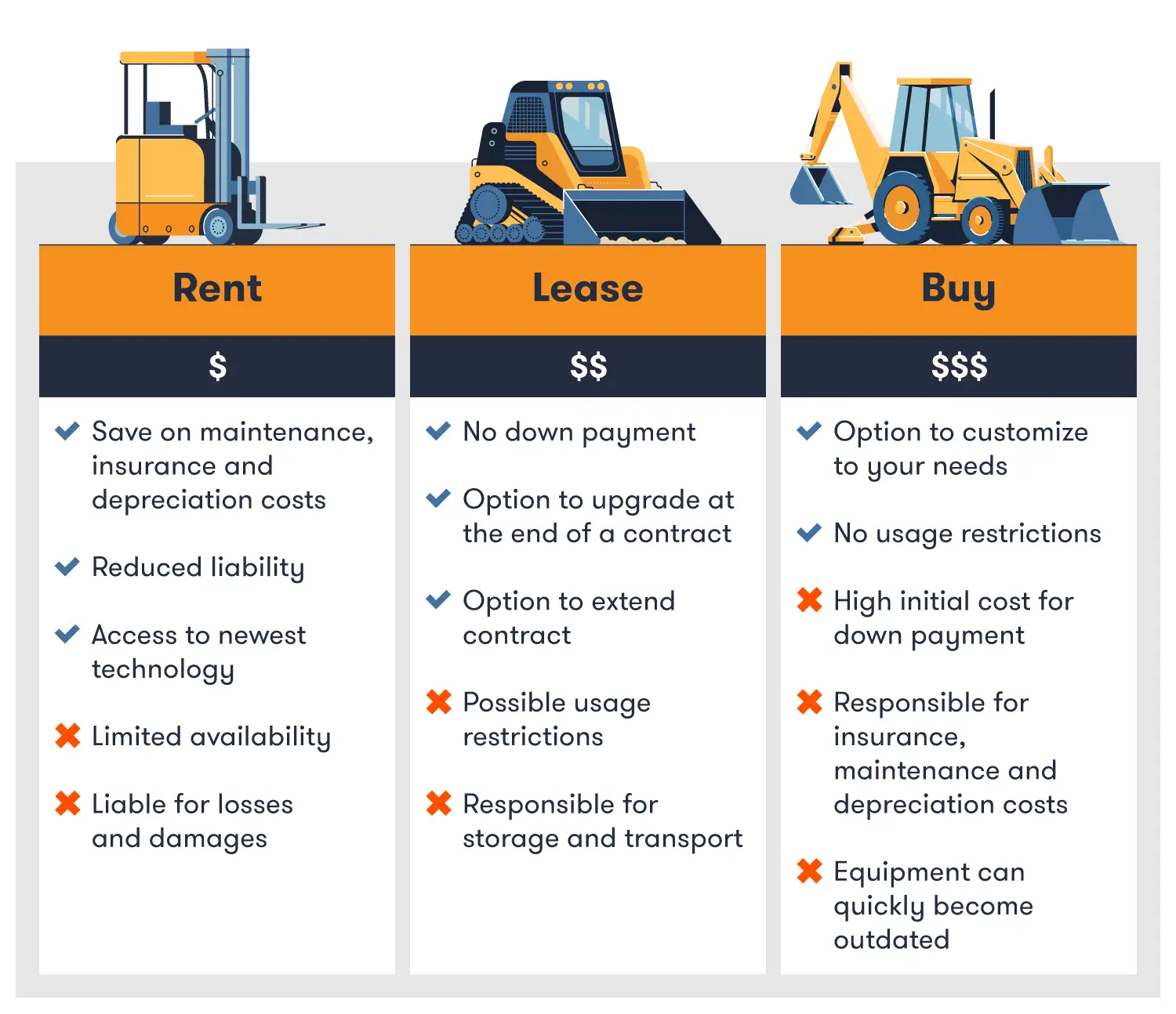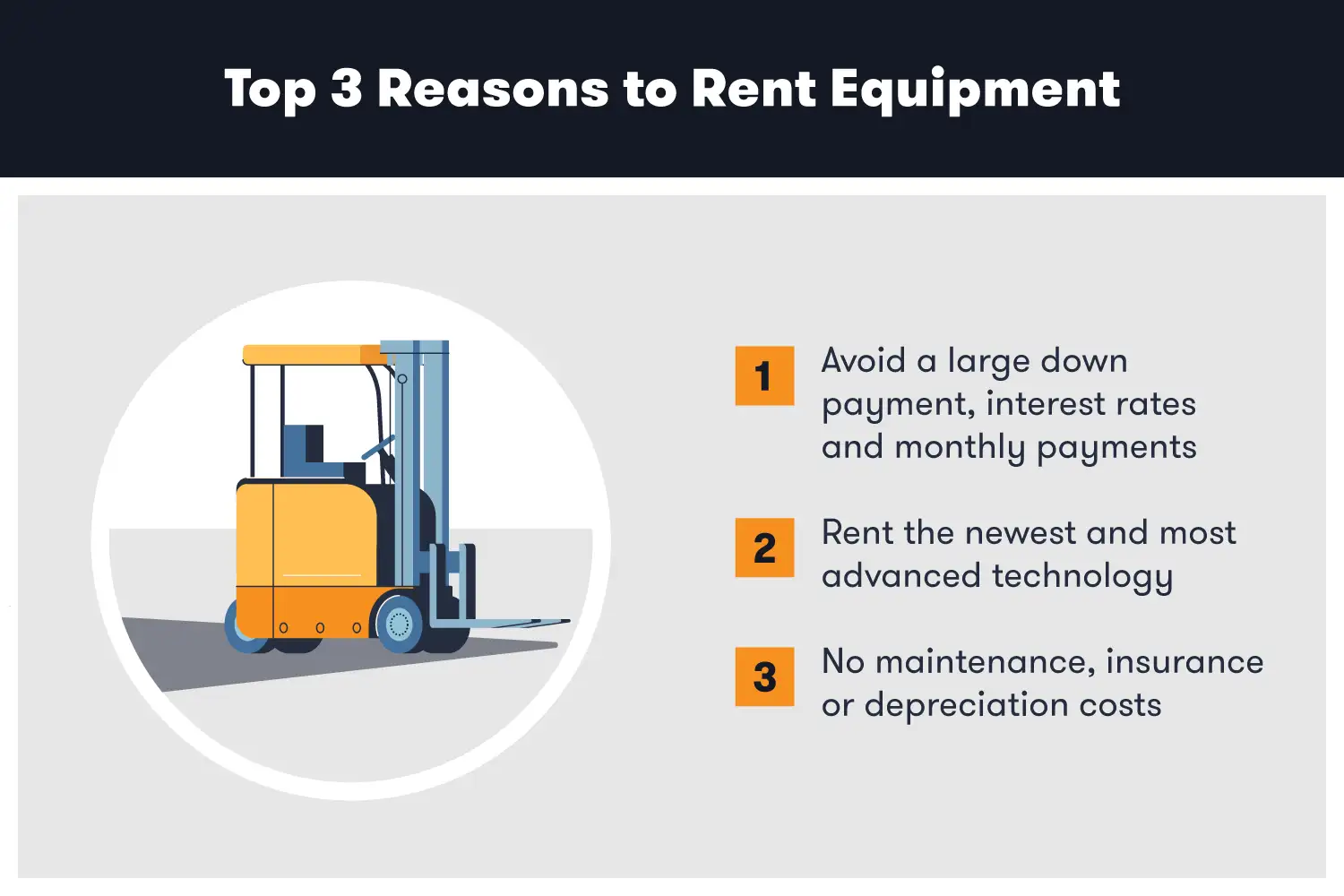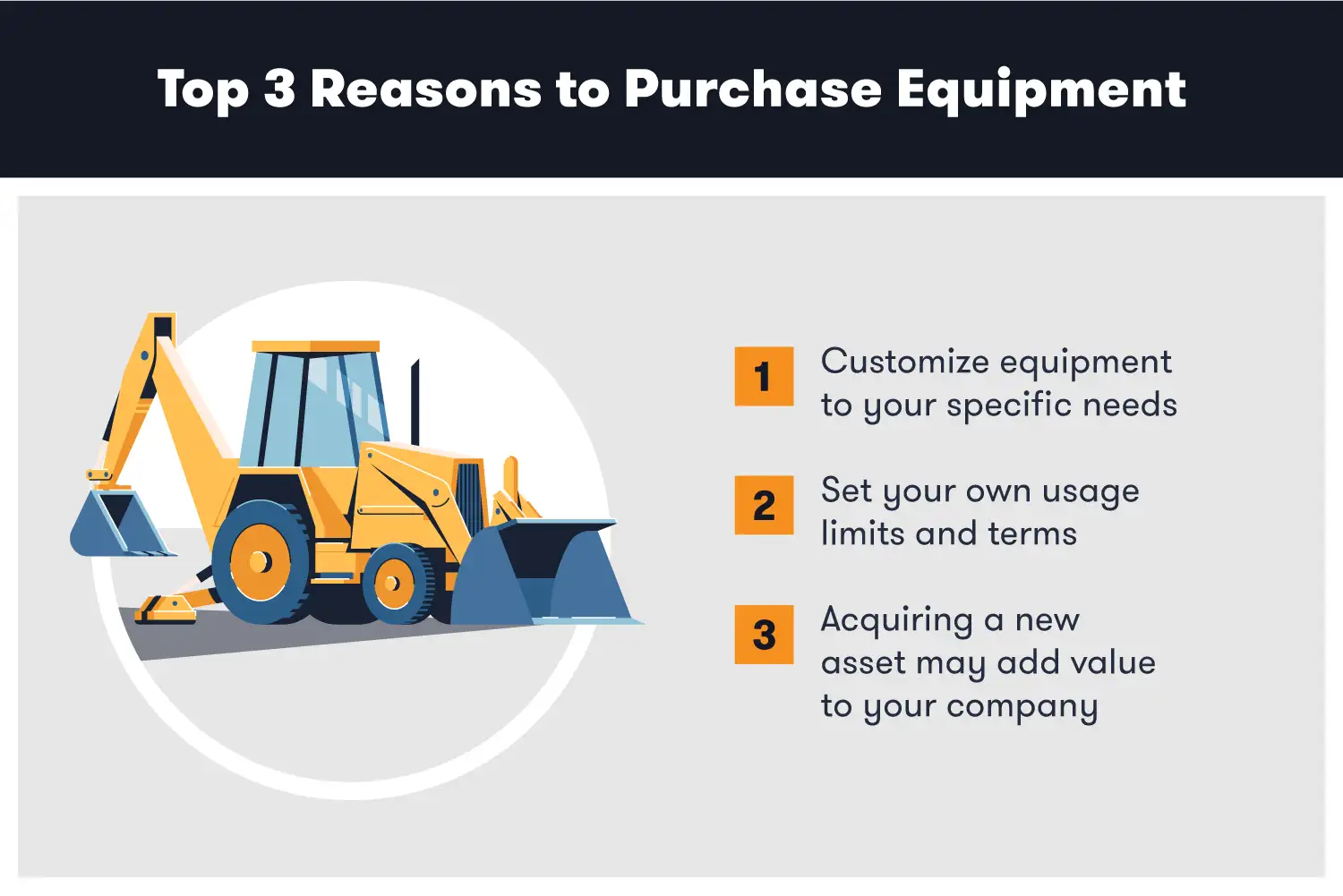Whether you’re starting a construction company, expanding your existing company’s scope or contracting some major work, you’ll need the right equipment to get the job done. Buying equipment outright isn’t always the answer, though.
Owning equipment can be a big liability for your company, and purchasing can cost you in a big way. Renting your construction equipment is another option you might consider when you’re not ready to buy, which may leave you wondering whether you should rent or lease equipment.
In this article, we’ll break down when to rent, lease or buy your construction equipment to help you decide the best option for you and your company.
When Should You Rent Equipment?
Construction jobs often require specialized heavy machinery, but how often do you find yourself utilizing a certain piece of equipment? Renting allows you to have access to necessary work equipment without paying a significant upfront cost, monthly loan payments, or monthly leasing payments. Instead, you can rent your equipment for a few days, weeks, or months at a time.
Pros of renting equipment:
- You can avoid a down payment and high monthly payments
- Your liability is greatly reduced
- You will have access to the newest technology
- You are not responsible for maintenance or associated costs
- There is no need to store it yourself
- You will avoid depreciation costs
- You will save on insurance costs
- All of the transportation is done for you
Cons of renting equipment:
- You could incur increasing long-term costs if you rent frequently
- You are limited to the availability of the rental service
- You’re liable for losses and damages
- You cannot customize the equipment to your liking
The process of renting construction equipment is fairly straightforward. You’ll first have to find a provider in your area that can fulfill your needs with all the equipment you might need for current and future projects. Your provider should also be an expert in the field so they can provide you with guiding advice on the appropriate machinery to rent for specific jobs.
Once you find a great service and equipment for the right price, you’ll sign a rental agreement. This contract lays out the terms and conditions of the rental, like payment terms and the liability you take on if the machine is returned damaged.
Depending on the equipment, you may undergo some operating training or instruction with the rental service to ensure your safety and proper use of the machine. Once you complete the training and the contract is signed, the equipment is delivered to your worksite.
Once the job is complete and your rental period comes to an end, the rental company will come back to your worksite to pick up the equipment to return it.
Key takeaway: Renting equipment is a money- and time-saving option that is best for jobs that require specialized equipment that you would not regularly use in other projects.
When Should You Lease Equipment?
A lease is a contract between two parties where one owns the property or equipment and rents to the other for an extended period in exchange for periodic payments. In this case, the lessor would rent out construction equipment for a set time while the lessee makes payments throughout the lease term.
Leasing equipment is the route many people take when they’re not ready to purchase equipment but need the machine for longer than a few months. Leasing equipment is different than renting because it typically covers a longer period of time, like one year or 18 months.
A lease also differs from renting because there are more options than returning the equipment at the end of the contract. When a lease contract expires, you could choose to return the equipment, renew the lease or, in some cases, purchase the equipment outright.
Pros of leasing equipment:
- You will avoid the upfront cost of a down payment
- You may have the option to buy if you like the model
- You can regularly upgrade your equipment at end of each contract
- You’ll have reduced maintenance costs
- You have the option to extend your contract
Cons of leasing equipment:
- Leasing comes at a higher cost than renting if you don’t use the equipment daily
- There may be usage restrictions written into the leasing contract
- You’re responsible for losses and damages
- You cannot customize the equipment to your liking
- You may be responsible for storage and transport
The process of leasing equipment is more extensive than that of renting. Since it’s a financial contract, you have to apply for a lease. Your application will include key financial data from your company, which is essential so that the lessor can ensure that you can afford to make the payments.
Once the lessor reviews and approves your application, they will offer you a contract. It’s vital to read over the contract carefully and bring up any questions you may have. If you’re unclear about certain terms consult a lawyer or initiate an open conversation with your lessor.
Once you and the lessor come to an agreement, you will sign the contract and submit it with an initial payment. Now the equipment is yours to use!
Key takeaway: Leasing equipment is a bigger financial responsibility than renting but could be a better option if your company needs to use the equipment for more than a few months at a time. Leasing is still less expensive than purchasing upfront since a lease does not require a hefty down payment.
When Should You Buy Equipment?
Your last option is to buy your construction equipment, which comes at a much higher upfront cost. However, the purchase could be worth it if your company uses the equipment regularly. Many companies choose to finance their equipment by offering down payment and monthly payments (including interest) until it is paid off. Ownership over equipment does come with advantages, such as tax benefits and asset value. While these benefits are significant, the ultimate question you should ask yourself before purchasing is if you will get your money’s worth.
Pros of purchasing equipment:
- You can customize the equipment to your needs
- There are no usage restrictions
- There may be tax benefits and write-offs
- You will add value to your company with a new asset
- It can be more cost-effective in the long run
Cons of purchasing equipment:
- You’ll pay a high initial cost, even when financing
- You’re responsible for maintenance and associated costs
- You’ll likely acquire some depreciation costs
- You have to pay monthly interest on your loan
- You could get stuck with outdated equipment that still needs paying off
- You’re responsible for storage and transport
- You’re responsible for insurance costs
As you know, buying construction equipment is a significant investment, so it’s important to take your time to analyze all your options. Here is a list of criteria you should consider when you’re in the market to purchase equipment:
- Performance reviews
- Brand or supplier
- Resale value
- Pricing
- Financing packages
- Equipment service
- Warranty
- Availability of replacement parts
Buying construction equipment is a lot like purchasing a car. When you decide on the equipment you want, you’ll find a dealer, test out the equipment and negotiate a deal. Once you and the dealer agree on a price and the other conditions of your financing, you can finalize the purchase by signing your contract and submitting your down payment. At this point, you will arrange for the delivery of the machinery. When delivered, ensure you properly set up and test the equipment before use. You should always train your crew on safety practices before they operate the equipment.
Key takeaway: Buying construction machinery is the most expensive way to acquire equipment for a job. However, it can be cost-effective in the long run if you know that you’d use the equipment regularly. Before making a purchase, do your research and determine if you’ll get a significant return on your investment.
6 Reasons to Rent Construction Equipment
From pricing to compliance concerns to technological advances, here are six reasons to consider renting your equipment over buying or leasing.
1. Purchase Price
If you’ve already started to price out the lifts and loaders that your company needs, then you know that the cost of buying new construction equipment can be prohibitively high. A typical contracting company has to save for an extended period to afford to buy heavy construction equipment.
Even if you do budget for such a major purchase, the transaction can make a big impact on the company’s cash flow. Keep this in mind as you’re running the numbers and considering your options. After all, you don’t want to outlay the cash to purchase the equipment you need and find out that you can’t afford to make payroll on time.
If your company can’t afford to pay the full price upfront, you might be tempted to take on debt to finance your purchase. This can help you get the equipment you need more quickly, but borrowing isn’t always a smart decision. With interest charges, you’ll end up paying more to buy what you need. If you aren’t using that new equipment around the clock, the purchase price and interest payments might not add up.
In contrast, renting equipment comes with a fixed monthly cost. This is much more affordable for most contracting companies. Since they buy equipment in bulk, rental companies have extraordinary bidding power. That means they can purchase loaders, backhoes, and skid steers at a lower cost than smaller construction companies could.
When your rental company passes on its savings, you’ll get a much better deal on machinery. Your construction company can use the equipment it needs at prices that work with its project budgets.
2. Depreciation Costs
If your business considers purchasing equipment, you also have to factor in the cost of depreciation. That excavator might be shiny and new when it first rolls into your garage, but it loses value over time.
The value of all machinery depreciates from one year to the next. Since construction equipment undergoes a lot of wear and tear, it could lose value quickly. If you go to resell your equipment in the future, you could find that the value isn’t there anymore. You might have to sell at a price that’s much lower than anticipated, which could be bad news for your budget.
The cost of depreciation can also have an unexpected effect on your construction company’s taxes. Your business could encounter additional financial losses and have trouble recovering your original investment.
In contrast, when you rent, you can set aside any worry about depreciation. This figure doesn’t apply to rentals. Instead, your company can deduct rental payments as business expenses. This can amount to additional savings for your company.
Also, banks and other creditors tend to consider major equipment purchases as liabilities. However, they don’t view rentals this way. That means renting equipment won’t harm your ability to borrow funds for land, property, or other business purposes. Renting also won’t impact your business’s credit rating nearly as much as a major purchase would.
3. Insurance and Maintenance Costs
The cost of buying and owning equipment can be significant. As you’ll quickly learn, this is far from the only cost your company should budget for.
When you own, the cost of insurance can be huge. Each machine requires insurance for theft and damage. If your company is on the small side, you might not have much negotiation power with your insurance company. This can mean high premiums and added costs.
When you buy equipment, you also have to pay to maintain it. This can include annual tune-ups as well as unplanned repairs.
In fact, it can include any number of issues and expenses. If your machinery breaks down often or if you have a large inventory, the costs can add up quickly.
In contrast, when you rent skid steers and backhoes, you don’t have to pay these extra costs. Instead of charging insurance and maintenance separately, most rental companies include these costs as part of a package rate. Maintenance and insurance aren’t free, but you can get them at a steep discount from your rental company.
Some companies train their teams to do tune-ups to save money on maintaining owned equipment. When you rent, however, you don’t have to worry about doing maintenance yourself. Instead, you can leave this job to the pros.
Rental companies usually handle all repairs and maintenance in-house. That means your team can take tuneups off their to-do lists.
4. Storage and Transportation Issues
When you work in construction, logistics can be a constant struggle. From keeping jobs on schedule to securing the right permits, each job has tons of moving parts. Most contractors don’t need yet another issue to deal with.
However, when you own machinery, you’ll have to handle those logistics, too. Moving equipment from one job to the next isn’t easy. Depending on the size, you may have to rent tractor-trailers and even get wide load permits. You’ll also have to pay personnel for loading and offloading equipment. All of this takes extra time, money, and planning.
Finishing a big job is a good feeling. But if you have to arrange to move machinery from the project site, the extra work can be a headache. When you own, you’ll also have to store your equipment. If you don’t have room for storage, you may have to pay to rent secure warehouse space to keep machinery safe and out of the elements.
Keep in mind that not just any storage spot will do. If you spend thousands of dollars on construction equipment, you need high-quality storage to keep your property in optimal shape.
If all of this sounds like a hassle, you should consider renting equipment instead. Rental companies typically include the cost of transportation and storage in your monthly rate. That means you already know how much to budget before you even start the project. You won’t rack up surprise fees for storage or transportation.
Also, rental companies handle the logistics for you. You don’t have to track down a tractor-trailer or find a storage location because it’s already under control. Just specify the right start and end dates for your rental, and the company will deliver and pick up the equipment right on time.
5. Compliance Concerns
When you work in construction, you become an expert at thinking outside of the box. Every day brings a new set of problems, and you have to have the tools to solve them.
At the same time, you also have to know how to follow the rules. No matter what type of construction your company does, you need to know federal and local building codes. These rules keep your projects safe, ensure happy customers and decrease your liability.
Construction equipment also has its set of rules. In fact, it’s subject to federal and local regulations. If you own machinery, your company is responsible for making sure it complies with the law. That means you might have to hire a dedicated compliance manager, train a team member, or contract an expert.
Managing compliance can be costly and could cause yet another hassle for your company. However, making sure that all of your equipment follows the rules is essential. If you don’t pay attention to equipment laws, you could end up spending even more.
In contrast, companies that rent equipment can leave the rules to the experts. You can rest assured that anything you rent meets the right standards. Rental companies have to make sure each piece of machinery meets emissions standards and stores fluids the right way.
Letting a pro handle compliance can be a huge weight off your shoulders. Taking this route allows you to stick to what you do best instead of adding more paperwork to your docket.
6. Cutting-Edge Technology
Buying equipment takes commitment. If you invest in machinery, you want to keep it for many years to come. That means you need the newest and best equipment. Heavily used equipment might be cheaper, but it won’t get the job done properly. Instead, you need cutting-edge technology that makes the job faster, easier, and safer.
Also, buying equipment means you have to budget for upgrades. If you don’t, you’ll have to keep using the same old machinery even when it’s obsolete.
In contrast, renting equipment usually means you get the latest equipment with the newest upgrades. Rental companies typically offer equipment that’s only a couple of years old. When you rent, you can rest assured that you’re getting the newest machinery that will help your company move forward.
Rent Heavy Equipment with BigRentz
Whether you want to save money, limit your liability, or get the newest machinery on the market, renting is a smart decision for your business. From forklifts to earthmoving equipment,
BigRentz has all the heavy machinery you want, right where you need it. BigRentz has all the equipment rentals you need to get the job done right every time.















